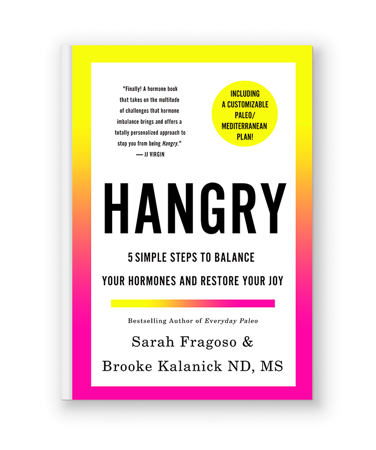
Standard lab testing for PCOS tends to include some blood glucose monitoring (often fasting glucose and maybe a hemoglobin A1C), estradiol and progesterone (especially if you’re not having a predictable period), perhaps LH and FSH evaluation (these pituitary hormones coordinate the menstrual cycle and are often askew with PCOS) and if you’re dealing with excess androgen symptoms such as breakouts, facial or body hair growth or head hair loss you’ll likely get a testosterone level as well.
While these tests can certainly help point towards a PCOS diagnosis and assess severity of insulin resistance they fall short in a few ways:
First, hormone testing for things like estrogen and progesterone are a snap shot of a hormone level that can tell us if that hormone is low but tells us very little about how well that hormone is being utilized and metabolized – both are key aspects to your overall hormone functioning and common issues with PCOS. Estrogen metabolism can be assessed via urine by analysis such as the DUTCH Test. I cover all this in my Guide To Lab Tests For Women & Their Hormones. Grab your FREE copy here.
Order Hangry right now!
If you’ve ever felt like a Hangry B*tch and are ready to balance your hormones and restore your joy in just 5 simple steps then Hangry is for you!
GET YOUR COPY NOW
Next, PCOS has some unique hormone excess type issues such as estrogen dominance (which is why you need that estrogen metabolism assessment I just mentioned) and receptor hypersensitivity to androgens. What this means is that your pores and hair follicles are often overly sensitive and responsive to testosterone and it’s metabolites like DHT. So it’s quite common for a woman with PCOS to have normal blood tests for say testosterone yet still be having high testosterone symptoms such as acne, facial or body hair growth and hair loss at the crown and temples. This is again because it just doesn’t take much for some of us to get an unwanted testosterone symptom when our follicles are a bit overreactive.
Finally, the standard PCOS related lab tests are good for diagnosis they can often do little towards helping you take some key diet and lifestyle steps to improve your day to day with PCOS nor do they help you suss out the underlying issues with this complex hormonal condition. This leaves most women frustrated and still unsure what steps to take.
Here are 3 tests/assessments that will help you do better with PCOS:
#1 hs-CRP or Otherwise Assessing Inflammation
It’s now believed that inflammation is the true root cause of PCOS and that this predisposition for inflammation actually creates or worsens insulin resistance and PCOS related hormonal imbalances. This complex interplay will be the subject of a FREE webinar I’m doing on September 16th. Get on the waitlist for my Empowered PCOS Program here to get access to this free webinar when I open up registration!
Order Hangry right now!
If you’ve ever felt like a Hangry B*tch and are ready to balance your hormones and restore your joy in just 5 simple steps then Hangry is for you!
GET YOUR COPY NOW
Inflammation is what I call the great hormone mess-maker as it’s something that will affect the function of all of your hormones. It is one of the most common issues I see when a woman has a host of symptoms of low hormone (i.e. estrogen symptoms such as hot flashes, vaginal dryness, light periods, etc. or thyroid symptoms such as fatigue, weight gain brain fog, etc.) yet their lab tests for say estrogen or thyroid are normal.
And oh so many of us are inflamed but don’t realize it.
Here are some common signs of inflammation:
- Digestive issues of any type including diarrhea, constipation, bloating, food reactions, etc.
- Any skin issues including acne, eczema, psoriasis, rosacea, etc.
- Water retention and puffiness (can be anywhere, often seen in the face under the eyes and belly area)
- Fatigue issue in general, poor exercise tolerance or brain based fatigue (i.e. tired after reading or driving)
- Depression or brain fog
- Pain of any type (chronic injuries or recurring pain, headaches, tendonitis, etc.)
- Allergies or sinus congestion
- Gum disease or bleeding gums
- Increasing reactivity to foods, jewelry, smells, etc.
Common causes of inflammation include:
- Dehydration
- Food sensitivities (to the common ones like dairy or gluten OR anything you are uniquely sensitive to; histamine intolerance)
- Disrupted gut flora ranging from overt pathogens, disrupted microbiota balance or bacteria not staying where they are supposed to (i.e. SIBO – small intestinal bacterial overgrowth)
- Poor estrogen metabolism
- Excessive oxidative stress (common with PCOS and any autoimmunity such as Hashimoto’s)
What you can do to manage inflammation is:
- Eat a diet high in veggies and high quality protein (grass fed beef/bison, free range/antibiotic/hormone free poultry, wild caught fish, etc.)
- Stay hydrated. 2-3 liters of water per day and many women with PCOS need extra electrolytes such as this.
- Get enough sleep! Super important and over looked source of inflammation.
- Exercise daily but not to the point of overtraining.
- Avoid any food that causes you inflammation: puffy face the next day, joint pain, digestive trouble, brain fog, lower energy, etc.
- Manage your stress. Chronic stress is a significant source of inflammation.
#2 Estrogen Metabolism
I’ve mentioned it twice now, it’s that important when you have PCOS! You can have this assessed by labs such as Genova Diagnostics or again the DUTCH test. Contact my office for more info.
You can also get at least a peak into one aspect of estrogen metabolism as it’s related to methylation by checking a homocysteine level on routine bloodwork. I cover this in my Guide To Lab Tests For Women & Their Hormones. Grab that here.
Order Hangry right now!
If you’ve ever felt like a Hangry B*tch and are ready to balance your hormones and restore your joy in just 5 simple steps then Hangry is for you!
GET YOUR COPY NOW
#3 OK this one is not actually a lab test: Monitoring Blood Glucose At Home
One of the biggest downsides to the typical glucose monitoring we do on a blood test is that it’s not showing us how you react to the food you eat every day – which is often much more interesting.
Women with PCOS are often told to just go low carb or just do whole grain carbs, when in reality each woman needs to find the carb amounts and types that work best for her.
Watching your between and post meal symptoms is one way, check out this post on how to find your Unique Carb Tolerance here.
In the end, I hope all women learn to tune into their hormone talk enough to just watch symptoms because it’s easy, painless and can be done anywhere for free BUT often it’s not super clear what your symptoms are telling you especially when you first start. This is when a simple, relatively small investment in a home glucose monitor can be life changing.
Typically reserved for diabetics, this little tool can help you get some real time, objective data about your blood sugar and a couple key PCOS hormones: insulin and cortisol. It can also be a bit of an assessment of food sensitivities as foods that cause us inflammation (i.e. gluten, dairy, etc.) can cause an exaggerated rise in blood glucose that doesn’t seem to match their carb content.
I cover exactly how to use a glucometer in this article, be sure to check it out. And remember that you won’t be sticking your fingers forever! You’ll likely pull this tool out from time to time only after you spend a few days with it and see how you respond to the real food you eat in real life not just what your glucose was one morning at the lab.
There you have it: three assessments that are so important to you getting your health and power back! My PCOS program is called Empowered PCOS because I felt so out of control and helpless when I got my PCOS diagnosis. I didn’t know what was going on with my body or how to help myself feel better. If you’d like that same power be sure to get on the waitlist for my PCOS program starting in September!
Get on the waitlist here.
Order Hangry right now!
If you’ve ever felt like a Hangry B*tch and are ready to balance your hormones and restore your joy in just 5 simple steps then Hangry is for you!
GET YOUR COPY NOW
